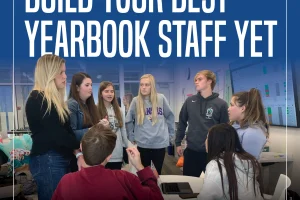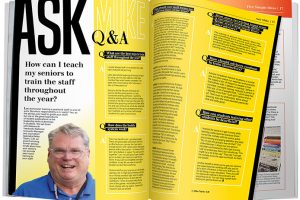Making changes by consensus
As advisers, every time we change something about how we organize our yearbook operations, there is bound to be some resistance. After all, “That’s not how we’ve done it in the past” seems to be a programmed response by many yearbook editors and staff.
I faced this during my first year as a yearbook adviser, even though I saw the need for one significant change: our yearbook is incomplete because it does not have any coverage of the spring and early summer activities due to our May delivery. To make that significant of a change, though, I had to first change the class from an editor-centered class to a class that is student-centered, led by the adviser, and one that encourages students to work together, solve problems and make collective decisions.
We began the year with a change in philosophy, and created a mission statement: “To produce a professional publication due to a team effort.” Because we now had a team-oriented approach to our yearbook, I felt the time was right to bring up the change I desired – an August delivery date.
I started by showing the class other yearbooks and explained how they had complete coverage of their schools while ours appeared incomplete. I was prepared for their resistance and planned to accept it because it is their yearbook. Their only issue was what to do about signatures, since delivery would be in August during summer break, instead of May while students were in school and able to sign each others’ books.
I fully anticipated this issue. I asked the students to not look at the change in delivery date as an inconvenience, but to focus on how we can make it work. What I did receive was a wonderful suggestion that everyone agreed upon immediately: that the staff create a 12-page spring preview to the yearbook, to be delivered in May, which highlights images from each section of the yearbook as well as provides students with an introductory teaser to the theme and, of course, pages to sign. Students could place that preview into their yearbooks when they received them in August.
We pitched our proposed changes to our administration and site council, made up of students, staff, parents and administrators. Our proposals were met with 100% approval as well as enthusiasm.
In the end, this change would not have been agreed upon if it were not for the team-oriented approach we now have as the core of our organization. Our solution was a result of a wonderful open forum where we, as a class, decided the fate of the yearbook rather than one student editor who may not understand all of the different voices that should be considered in the decision-making process – including the cry for coverage from the spring sports coaches, the prom committee and the senior board in charge of graduation. Now we are looking forward to years of producing professional publications due to team efforts.
Tag:Teaching Moments



